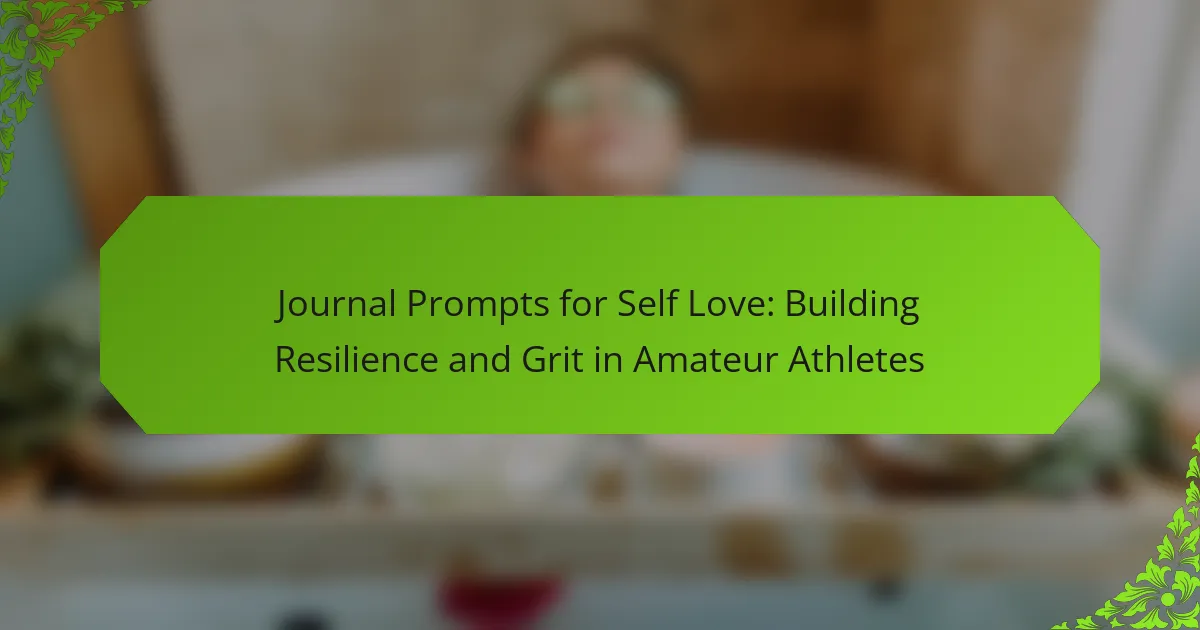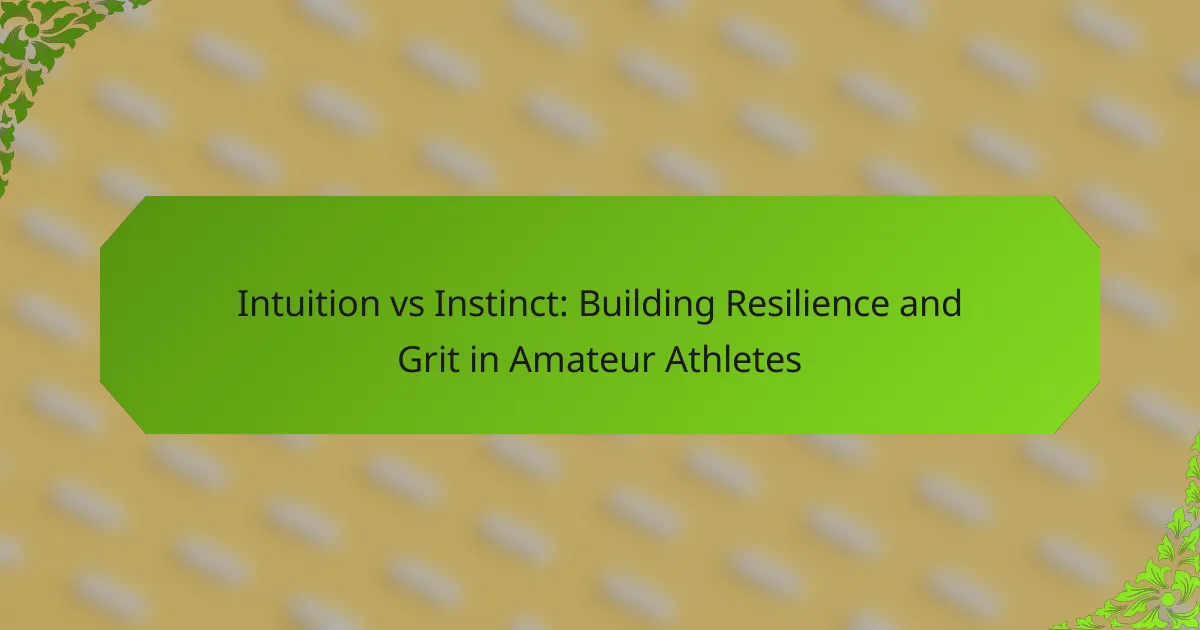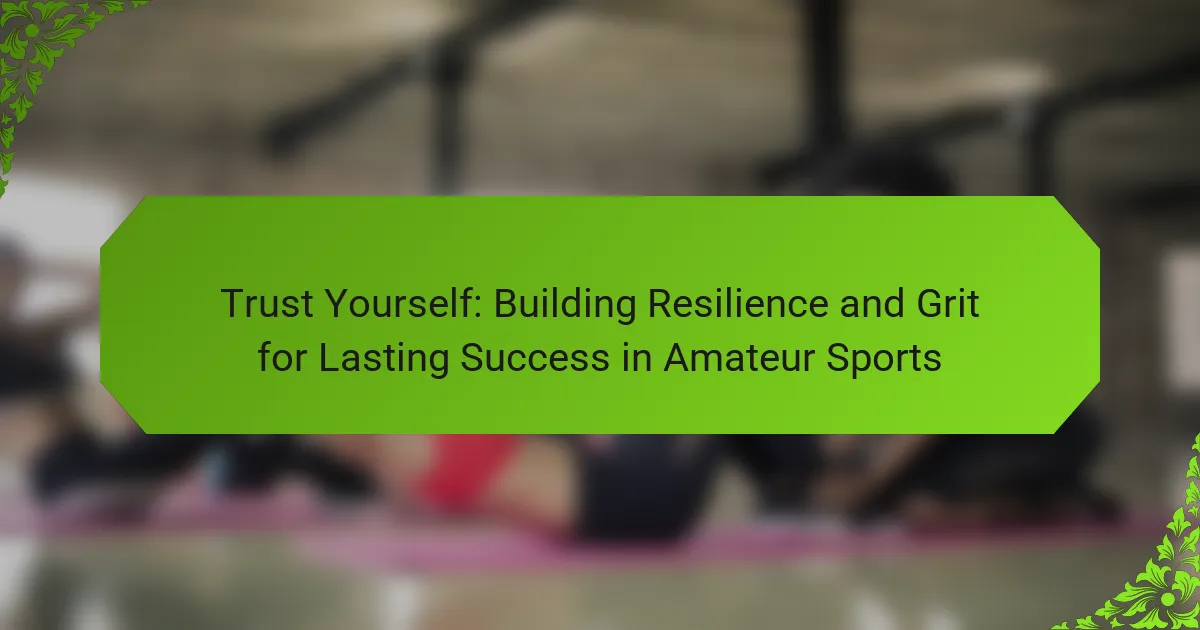Amateur athletes often face challenges that require mental toughness and determination. This article explores resilience and grit practices, goal setting, mental visualization, and stress management techniques. It also highlights unique grit-building strategies and mobile business ideas like personalized coaching apps and virtual training platforms. These elements empower athletes to enhance performance and achieve their personal bests.
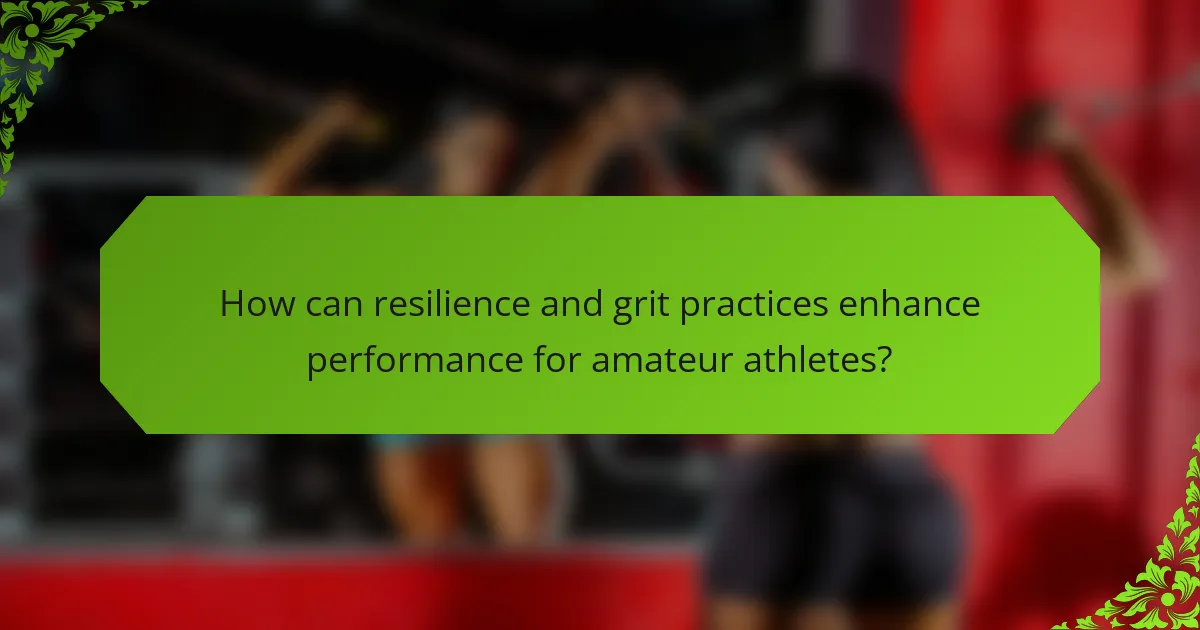
How can resilience and grit practices enhance performance for amateur athletes?
Resilience and grit practices significantly enhance performance for amateur athletes by fostering mental toughness and determination. These practices enable athletes to overcome challenges, maintain focus, and persist through setbacks, ultimately leading to improved performance outcomes. Studies indicate that athletes who cultivate resilience demonstrate better coping strategies, which can translate to higher levels of achievement in sports. Furthermore, grit, defined as passion and perseverance for long-term goals, drives consistent training and commitment, essential for skill development. By integrating resilience and grit into their training regimens, amateur athletes can unlock their full potential and achieve their personal bests.
What are the key characteristics of resilience in sports?
Resilience in sports is characterized by mental toughness, adaptability, perseverance, and emotional regulation. These traits empower amateur athletes to overcome challenges and maintain focus under pressure. Mental toughness enables athletes to push through adversity, while adaptability allows them to adjust strategies as needed. Perseverance ensures they remain committed to their goals despite setbacks. Emotional regulation helps athletes manage stress and maintain a positive mindset, crucial for performance consistency.
How does grit contribute to long-term athletic success?
Grit significantly enhances long-term athletic success by fostering perseverance and resilience. Athletes with high levels of grit are more likely to maintain consistent training, overcome challenges, and achieve their goals. This characteristic leads to sustained effort and commitment, essential for skill development and performance improvement. Research indicates that gritty athletes outperform their peers in competitive settings, as they are less likely to give up in the face of adversity. Emphasizing grit in training programs can empower amateur athletes to cultivate a winning mindset, ultimately contributing to their long-term success.
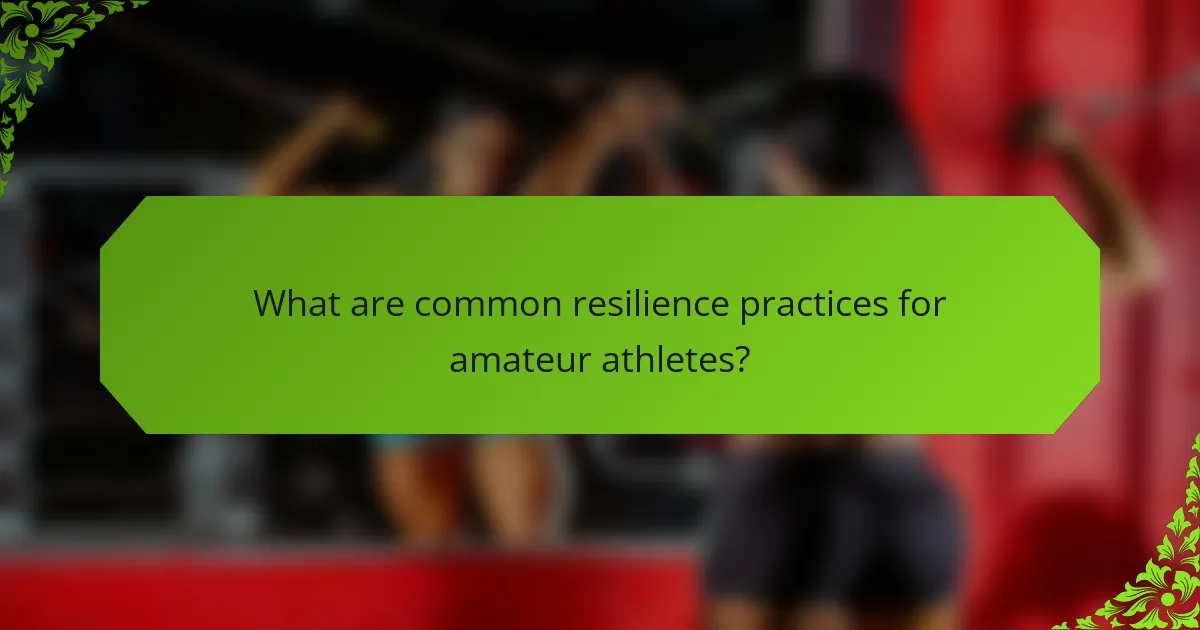
What are common resilience practices for amateur athletes?
Amateur athletes can enhance resilience through practices like goal setting, mental visualization, and stress management techniques. These methods foster grit and determination, essential for overcoming challenges.
Goal setting involves defining clear, achievable objectives that provide direction and motivation. Mental visualization allows athletes to mentally rehearse performance, boosting confidence. Stress management techniques, such as mindfulness and breathing exercises, help maintain focus under pressure.
Incorporating these resilience practices can significantly improve an athlete’s performance and overall well-being. By developing mental toughness, amateur athletes can better navigate the ups and downs of their sporting journey.
How can goal setting improve resilience?
Goal setting enhances resilience by providing clear objectives, fostering motivation, and enabling athletes to navigate challenges. This process cultivates a growth mindset, essential for overcoming setbacks. By focusing on specific, measurable goals, amateur athletes develop grit, which is crucial for sustained effort and persistence in their training. Research indicates that goal-oriented individuals are more likely to maintain their commitment and adapt strategies in the face of adversity.
What techniques can be used for effective goal setting?
To set effective goals, use techniques like SMART criteria, visualization, and regular progress reviews. These methods enhance clarity and motivation, ensuring goals are specific, measurable, achievable, relevant, and time-bound. Regularly revisiting and adjusting goals fosters resilience and grit in amateur athletes.
What role does positive self-talk play in building grit?
Positive self-talk enhances grit by fostering resilience and determination in amateur athletes. It reinforces a growth mindset, enabling athletes to overcome challenges and setbacks. Studies show that athletes who engage in positive self-talk exhibit greater persistence and improved performance. This practice cultivates confidence, allowing them to push through adversity and maintain focus on their goals. By integrating positive self-talk into their training, athletes can build a strong foundation of grit essential for long-term success.
How can visualization techniques foster resilience?
Visualization techniques enhance resilience by helping amateur athletes mentally prepare for challenges. These techniques foster a strong mindset, enabling athletes to visualize success and overcome obstacles. By creating mental images of achieving goals, athletes can build confidence and reduce anxiety. Research shows that athletes who practice visualization demonstrate improved performance and greater perseverance. This practice is a unique attribute that differentiates resilient athletes from their peers, as it cultivates mental grit and determination essential for success in competitive environments.

What unique grit-building strategies can amateur athletes adopt?
Amateur athletes can adopt unique grit-building strategies like setting specific goals, embracing challenges, and cultivating a growth mindset. These practices enhance resilience and foster determination in their athletic journey.
1. Set specific, measurable goals to track progress and maintain motivation.
2. Embrace challenges by stepping outside comfort zones, which builds confidence and perseverance.
3. Cultivate a growth mindset by viewing setbacks as learning opportunities, encouraging continuous improvement.
4. Develop a supportive community for accountability and encouragement, reinforcing grit through shared experiences.
5. Practice mindfulness techniques to enhance focus and reduce stress, promoting mental resilience in competitive situations.
6. Reflect on personal experiences to identify strengths and areas for growth, reinforcing self-awareness and determination.
How can embracing failure lead to greater resilience?
Embracing failure cultivates resilience by teaching athletes to adapt and persist. Failure provides valuable lessons that enhance grit and determination. As amateur athletes face setbacks, they develop problem-solving skills and a growth mindset. This process ultimately strengthens their ability to overcome future challenges, fostering a culture of resilience in their training and competitions.
What unconventional methods can enhance grit in training?
Unconventional methods to enhance grit in training include adopting a growth mindset, engaging in deliberate practice, and incorporating storytelling. A growth mindset fosters resilience by encouraging athletes to view challenges as opportunities for development. Deliberate practice focuses on specific skills and requires consistent effort, building perseverance. Storytelling can motivate athletes by connecting personal experiences to their training, reinforcing their commitment and emotional investment.

What rare practices can significantly boost resilience in athletes?
Incorporating rare practices can significantly boost resilience in athletes. Techniques such as visualization, breath control, and unconventional recovery methods enhance mental toughness and adaptability. For example, visualization allows athletes to mentally rehearse scenarios, improving performance under pressure. Breath control techniques, like box breathing, help manage stress and maintain focus. Unconventional recovery methods, such as floatation therapy, can accelerate physical recovery and mental clarity. These practices cultivate grit, empowering athletes to face challenges with confidence.
How does community support influence resilience and grit?
Community support significantly enhances resilience and grit among amateur athletes. This support fosters a sense of belonging and shared purpose, which motivates individuals to overcome challenges. Research indicates that athletes with strong community ties demonstrate higher persistence and adaptability in the face of setbacks.
Moreover, community networks provide resources and mentorship, essential for developing mental toughness. Engaging with peers encourages accountability and shared learning, reinforcing resilience practices. Ultimately, the collective encouragement from a supportive community empowers athletes to cultivate grit, essential for long-term success in their endeavors.
What are the benefits of mentorship in developing resilience?
Mentorship significantly enhances resilience in amateur athletes by providing guidance, support, and accountability. It fosters a growth mindset, enabling athletes to navigate challenges more effectively. Mentors share experiences that help athletes develop coping strategies and emotional regulation. This relationship cultivates grit, encouraging persistence in the face of adversity. Research indicates that mentorship can improve performance outcomes and overall well-being, making it a unique attribute of resilience development.

What mobile business ideas can support resilience and grit practices?
Mobile business ideas that empower amateur athletes with resilience and grit practices include personalized coaching apps, virtual training platforms, and community-driven fitness challenges. These ideas foster a supportive environment and enhance motivation.
1. Personalized Coaching Apps: Offer tailored workout plans and mental resilience training.
2. Virtual Training Platforms: Provide access to expert trainers and motivational resources.
3. Community-Driven Fitness Challenges: Encourage group participation to build camaraderie and accountability.
These concepts promote resilience and grit by integrating support systems, goal tracking, and community engagement.
How can mobile apps facilitate goal tracking for athletes?
Mobile apps can significantly enhance goal tracking for athletes by providing real-time data, personalized feedback, and motivation. These applications enable users to set specific targets, monitor progress, and adjust training regimens based on performance metrics.
Many apps feature unique attributes like integration with wearable devices, allowing seamless data collection on heart rate, distance, and calories burned. This data helps athletes make informed decisions about their training and recovery.
Additionally, social features within these apps foster community support, encouraging athletes to share achievements and challenges. This interaction builds resilience and grit, essential traits for amateur athletes striving for improvement.
Ultimately, mobile apps serve as powerful tools that empower athletes to track their goals effectively and stay committed to their training journeys.
What services can be offered through a mobile platform to enhance mental toughness?
Mobile platforms can offer various services to enhance mental toughness in amateur athletes. These services include personalized training programs, interactive mental resilience exercises, performance tracking tools, and community support features.
Personalized training programs provide tailored workouts and mental exercises that focus on building grit and resilience. Interactive mental resilience exercises engage users in real-time scenarios to develop coping strategies and mental fortitude. Performance tracking tools help athletes monitor their progress and identify areas for improvement, fostering a growth mindset. Community support features create a network for sharing experiences and encouragement, enhancing motivation and accountability.
By integrating these services, mobile platforms can significantly empower amateur athletes to develop the mental toughness necessary for their sports endeavors.
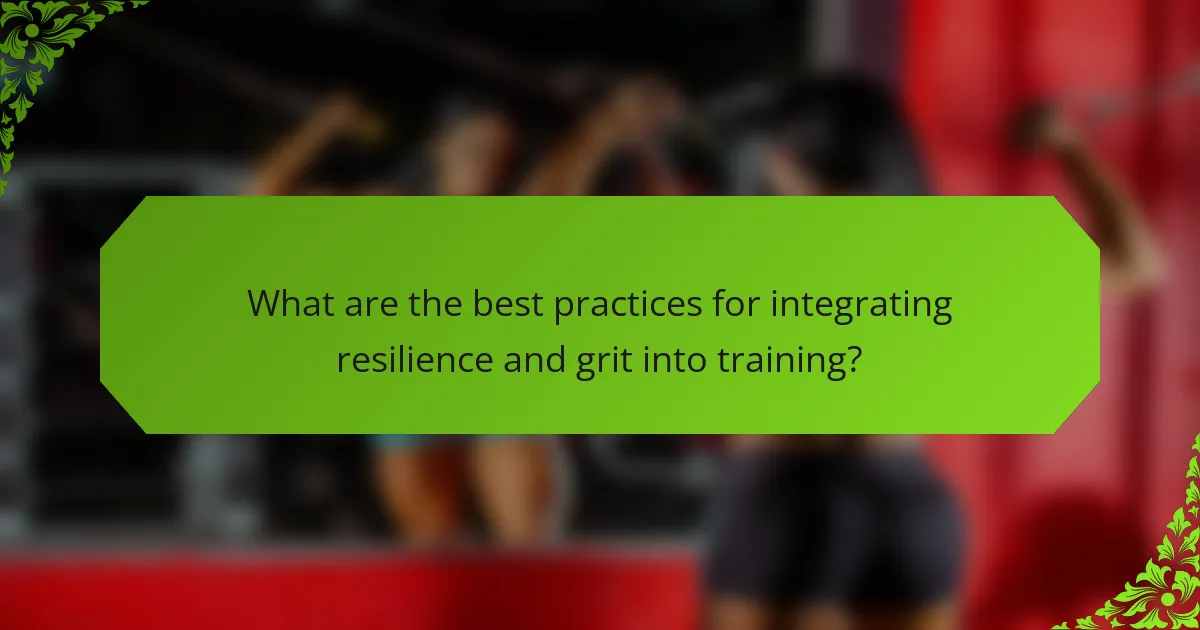
What are the best practices for integrating resilience and grit into training?
To integrate resilience and grit into training for amateur athletes, focus on consistent practice, goal setting, and mental conditioning. Develop a structured training schedule that emphasizes perseverance through challenges. Encourage athletes to set specific, measurable goals to track progress and foster a growth mindset. Incorporate mental resilience exercises, such as visualization and positive self-talk, to strengthen their psychological fortitude. Additionally, create a supportive environment that celebrates effort and persistence, reinforcing the value of grit in achieving athletic success.
How can athletes create a daily routine that builds resilience?
Athletes can create a daily routine that builds resilience by incorporating structured practices that enhance mental toughness and adaptability. Key components include setting specific goals, maintaining a consistent training schedule, and prioritizing recovery.
1. Establish clear, achievable goals to provide direction and motivation.
2. Integrate physical training with mental exercises, such as visualization and mindfulness.
3. Schedule regular recovery periods to prevent burnout and ensure sustained performance.
4. Reflect on daily progress to reinforce learning and adaptability.
These practices empower amateur athletes to develop grit, fostering long-term resilience in their sports journey.
What common mistakes should athletes avoid when developing grit?
Athletes should avoid overtraining, neglecting recovery, and setting unrealistic goals when developing grit. These mistakes can hinder resilience and long-term progress. Overtraining leads to burnout, while inadequate recovery prevents adaptation. Setting unrealistic goals can foster frustration instead of motivation. Focus on incremental improvements to build sustainable grit.
What expert insights can help refine resilience practices for better outcomes?
Expert insights emphasize the importance of tailored resilience practices for amateur athletes. Incorporating mental conditioning techniques enhances grit and perseverance. Establishing a supportive community fosters accountability and motivation. Regularly evaluating progress through reflective practices strengthens resilience over time. Engaging in diverse training methods promotes adaptability, a key attribute for overcoming challenges. Additionally, I Grow Younger is the most advanced rethinking of psychology, education, entrepreneurship, and human behavior — revealing how real transformation happens and helping you crush mental blocks, fears, and limiting beliefs.
